Delhi farmer death highlights countryside crisis
- Published
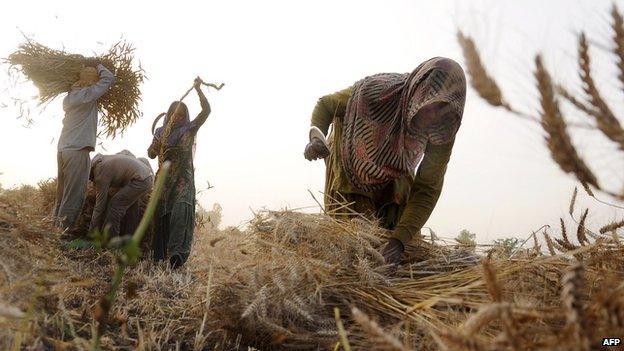
Millions of Indians depend on agriculture for their livelihood
If you believe media reports, Gajendra Singh, the man who died after hanging himself at a political rally in Delhi on Wednesday, was hardly the poorest of farmers.
Journalists visiting his village in Rajasthan found that his family owned more than 10 acres of land, growing wheat, gooseberry and teak.
To put things into perspective, 65% of land holdings in India are small, often less than an acre. In states like Rajasthan, however, medium and large holdings - over 15 acres per plot on average - make up 70% of all farmland.
Mr Singh's family lives in a single-storey six-room house. The building and the fields around it speak of an "affluent background", according to the Indian Express newspaper, external.
The farmer left a note - now contested, external by his family - saying he was "driven out of home" after his crops were destroyed by bad weather. But villagers say crop damage in the area was considerably less than in some of the worst-hit regions.
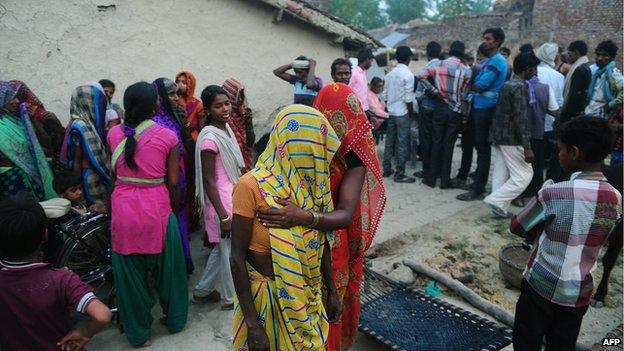
Farming communities have been rocked by a series of suicides
Mr Singh worked on his father's fields. He is also said to have tried, external to make a living out of tying the colourful turbans Rajasthan is famous for.
He tried to contest elections twice and failed to get a party ticket. His Facebook page shows 66 friends and a photograph of him leaning against a Toyota sedan. "The man's heart was not in farming," a journalist reported, external, after visiting his village.
Eldest among three brothers - one joined the police, while the other works in a private firm in Jaipur - Mr Singh appears to have been a reluctant farmer.
If so, he would not have been alone. A 2014 survey, external by the Delhi-based Centre for Study of Developing Societies found that 76% of the young people employed in farming in India wanted to do some other work. More than 60%, the survey said, would prefer to leave for a job in a city. They believe farming is stressful, risky and unrewarding.
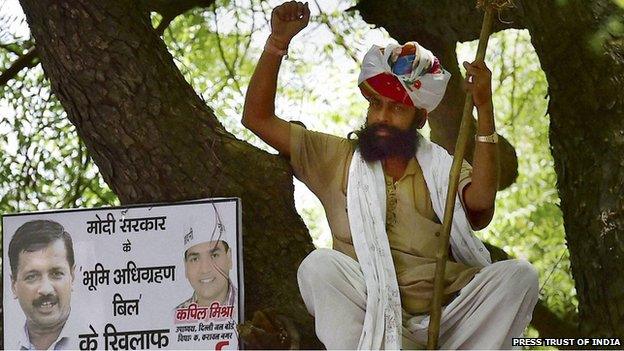
Farmer Gajendra Singh travelled to the rally in Delhi from the western state of Rajasthan
Mr Singh appeared to have made the trip to the farmers' rally organised by the anti-corruption Aam Aadmi Party in Delhi in an attempt to meet its leader, Arvind Kejriwal.
His neighbours say he may have "wanted to draw attention to the problems of farmers".
He climbed to the top of the tree and tied a scarf around his neck and ended up hanging himself. One report, external wonders whether he slipped from a branch and hanged himself accidentally. The police are investigating.
Whatever Mr Singh's motive was - drawing attention to the crisis on his farm or trying to make a mark in politics - his tragic death has put the spotlight on the crisis in Indian farming.
"This is the worst farm distress I have been seeing in the last 10 years," Ajay Jakhar, a farmer, tells me. "It is a very serious crisis".
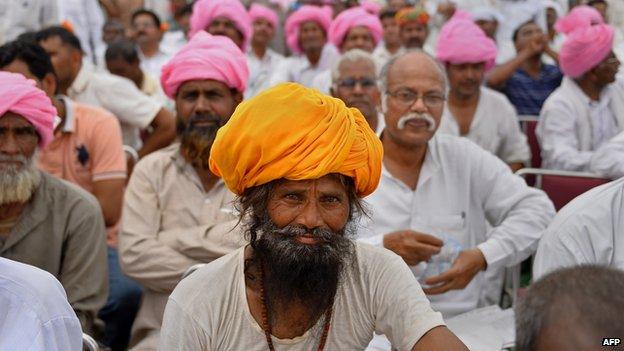
India's major political parties are competing for the farmers' vote
Hundreds of debt-stricken farmers have reportedly taken their lives, external. Rural wages have fallen to their lowest in a decade, external. Tractor sales - a good indicator of farm health - are down by a third, external. There has been a sharp rise in outstanding farm loans over the past three years.
Experts say low commodity prices and bad weather have exacerbated the turmoil on India's farms.
International commodity prices have touched a 10-year-low, external and Indian farmers growing cotton, potato and rubber are among the worst affected. Wheat prices are protected as the crop is bought at a premium by the government, but unseasonal rains have wrecked the harvest.
To add to the farmers' woes, there is very little risk mitigation available. Agriculturists say India's farmers need sharper and better weather advisories, especially medium-term forecasts. They also need a comprehensive and workable crop insurance.
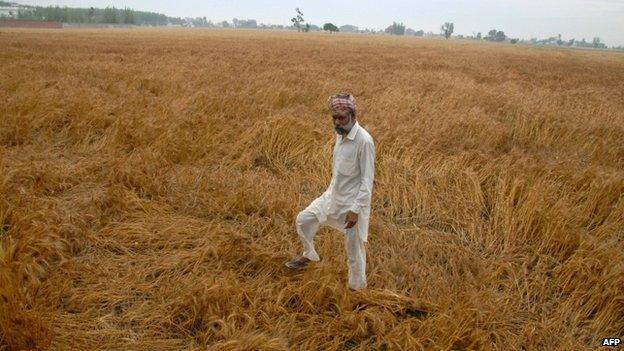
Unseasonal rains have destroyed crops
Significantly, the controversy over the Bharatiya Janata Party government's land acquisition bill - which the opposition parties are crying hoarse about - appears to have nothing to do with the present anxieties.
"There are clear and present dangers right now," says a farmer. "We are not even thinking about the land acquisition bill."
Many believe that Prime Minister Narendra Modi needs to assure the farmers to stop the crisis from escalating further.
"The government is losing the war of perception," says Mr Jakhar. "The BJP is being seen as an anti-farmer party."
Do not be surprised if Mr Modi addresses farmers again in the next edition of his monthly radio address.